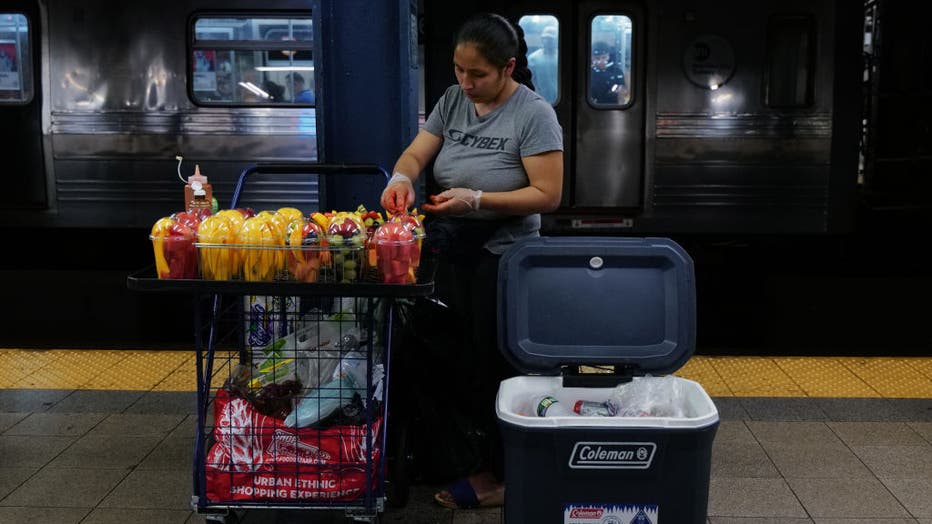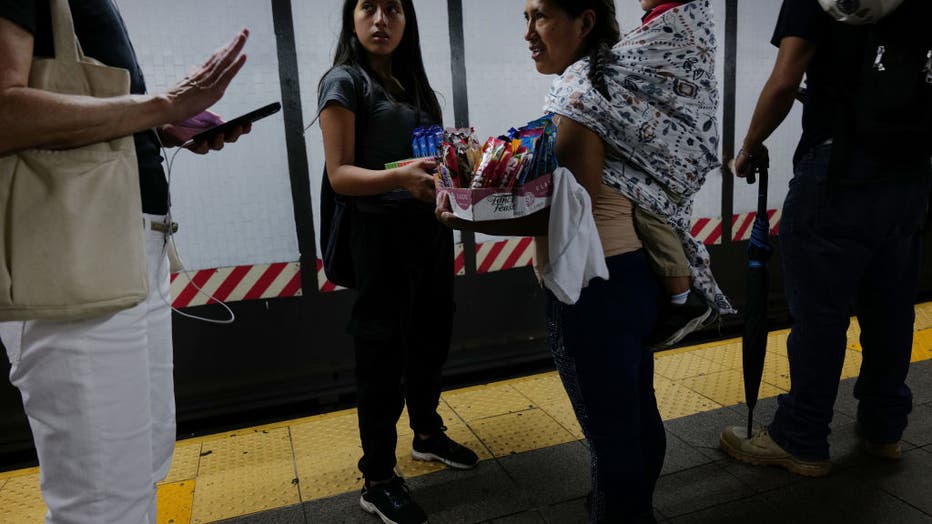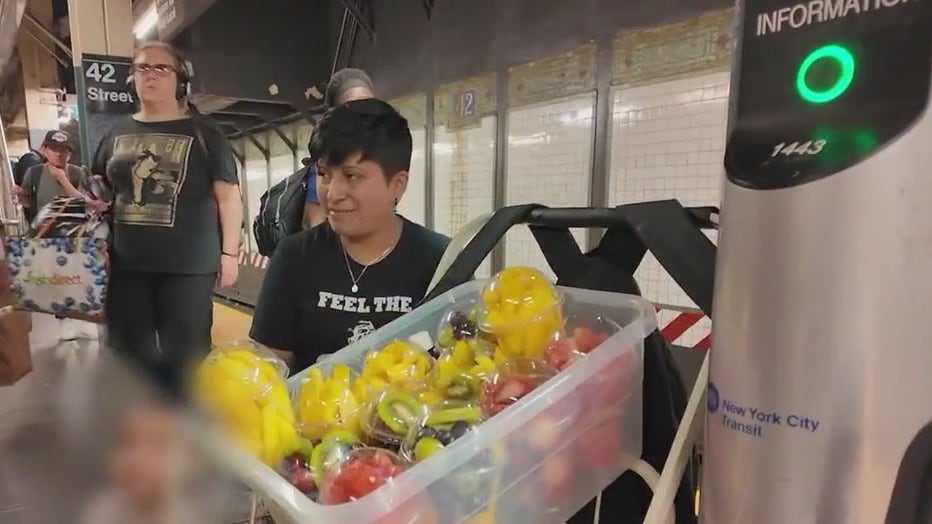NYC migrant mothers selling candy with their young children: 'We don't have a choice'

Migrant moms selling candy on NYC subways to survive
It's become a common sight on the subways, to get approached by someone selling candy. Many of them are actually migrant mothers who carry their babies on their backs. FOX 5 NY’s Jessica Formoso shows us these young women feel they have no other option, but to make a living this way.
NEW YORK CITY - Down in the subways of New York City, it's the hustle and bustle of city life, but among those rushing to get places are moms with their babies.
They are young migrant mothers with their little ones strapped to their backs working.
They sell fruit, water, candy trying to make a living in a new country.
But at what cost? Some say they are putting the lives of their children in danger, and they themselves know they are.

NEW YORK, NEW YORK - A woman sells candy and other items in a New York City subway station in New York City. Over 70,000 asylum-seekers have arrived in New York City since last year, according to City Hall, and many have taken to selling items on the
"It is quite dangerous for her, but we don't have a choice, because otherwise how can we earn money?" said Maria, a migrant mother in Spanish.
Maria and her 1-year-old baby
We met Maria and her one-year-old-daughter Brianna, in Midtown. She stands just off the edge of the tracks with her cart and cooler selling water and cups of chopped fruit.
Her one-year-old is now mobile, walking, not staying still in a busy subway station, where hundreds are walking by and trains are pulling in and out of the station. "Is it difficult to work with your baby?" asked Fox 5's Jessica Formoso.

NEW YORK, NEW YORK - AUGUST 18: A teenager and a woman sell candy and other items in a New York City subway car on August 18, 2023 in New York City. Over 70,000 asylum-seekers have arrived in New York City since last year, according to City Hall, and
Maria said yes. "Very difficult, now that he wants to walk and everything, she doesn't stay still. It scares me, and aside from that the police comes and take our things because the truth is we are not allowed to sell, but this is all we can do with our babies."
Maria and her two daughters are currently living in one of the city’s migrant shelters. About three months ago she decided to start buying fruit at a stand near the shelter and selling it. She spends $50 in buying the products. On a good day she can walk away with $100 bucks. "You don't earn enough but, I have to go out because you can't find a job."
"This really started as soon as asylum-seekers started arriving and then found that they did not have other alternatives for working in the formal or the informal economy," said Liza Schwartzwald, Director of Economic Justice and Family Empowerment at the New York Immigration Coalition.

Our cameras found another young mother off the Long Island Expressway at a heavily trafficked street.
Maria from Ecuador and her one-year-old daughter work off Van Dam Street. Every day she is out here selling cups of chopped fruit for $5. No matter how hot or cold it is. They walk in the middle of vehicles when traffic stops, hoping to sell out for the day.
She arrived 2 years ago and for the past year has been selling fruit. How difficult is it to be here working with the baby? Asked reporter, Jessica Formoso.
"It's very difficult," answered the young mom.
"How much do you earn each day?"
"Sometimes $100. On a bad day."
"Is it enough for rent, meals, food for the baby?"
"No," Maria says.
Migrant safety
"Do you feel unsafe walking in between cars with your child?" asked Formoso.
"Yes, there is no one I can leave her with."
"You don't have family here? "
"No."
Having no one to leave their babies with is the main problem these mothers have.
"Often the parents feel the safest place they can be with their children is with them directly because they don't have another safe place to bring their kids, but that's a problem of lack of access to safety," said Schwartzwald.

Debit card program expanded for migrant families
NYC is expanding a program providing migrant families with debit cards to buy food and baby essentials. FOX 5 NY's Jessica Formoso has the details.
The city is aware of the issue. It is stepping up outreach in shelters, subways, and across the city, handing out educational materials in multiple languages (including Spanish and an Ecuadorian dialect) informing parents of resources available to them, sending teams into migrant shelters to enroll migrant families in child care, after school programs, and DOE schools.
In a statement to Fox 5, a spokesperson for city hall says:
"The health and safety, especially that of children are always top priorities for our administration, which is why we're expanding outreach to ensure every migrant parent knows about the support available for their children. we are intensifying our work both in migrant shelters and on the subways to ensure school-aged children are enrolled in schools and parents know about safe after school and childcare programs available to kids."
Legal work
"What we found when we were speaking to some of the parents on the trains is that some of them are work authorized, some of them actually are able to legally work, in New York City, could get a job at their corner store, could get a job doing something else. The only reason they cannot do that is they do not have a place to bring their children," said Schwartzwald.
Back on the streets of NYC, in Jackson Heights, Queens outside the Roosevelt Ave-Jackson Heights subway station is 55-years-old Hasinta and her two grandchildren.

Fleeing China for a better life | Migrants in America
As the city continues to grapple with the migrant crisis, we are taking a closer look at the experiences of one group making this their new home. Chinese nationals are among those crossing the southern border and settling in New York City. FOX 5 NY's Stephanie Bertini has the latest in our "Migrants in America" series.
"If they would help me with the working papers, I'll go to work because that's why we come her," said Hasinta.
She arrived over a year ago from Ecuador, spent 2 months looking for work and nothing, so she started selling waters. Now she's selling candy. She brings with her her 6-month-old granddaughter and her grandson. They are out there with her until her daughter picks them up after work.
She invests about $120-$150 in buying the candy to resell. She says she buys it on her own and everything she makes she keeps.
"On a normal day like today, how much do you make? So yesterday, I sold $380. For me, it's good because if I go to work they would pay me $150 a day."
These women are making cash on the spot.
For them, that means being able to put food on the table for their families.
They are aware of the danger and know it's not legal, but say there is no other option.

